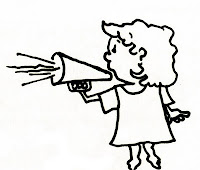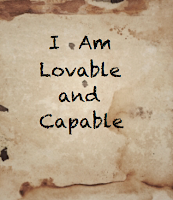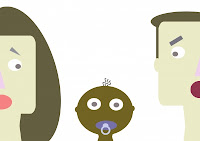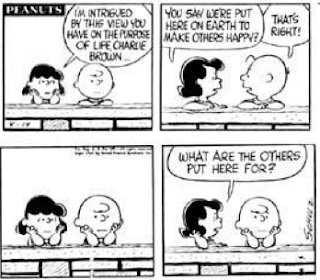New Year's Resolutions - a tradition we all seem bound by every year - and one which is usually followed by another, equally widely held tradition - breaking those resolutions.

It seems nearly 90% of us break our resolutions every year! How can this be? How come it’s so difficult to stick to something we’ve resolved to do? Looking at the research, the only conclusion can be that we let our emotions sabotage us. Well here’s the good news: researchers have also studied ways to keep resolutions, and here a few to keep you going:
1. Focus on the positive! Most of us get discourage and even depressed when we are unsuccessful and then we focus on that, the negative – and our internal dialogue might sound something like this “See! There you go, you can’t even keep up a simple task!” This will just re-enforce the failure, making success even less likely. Instead, focus on finding the positive. For example, ask yourself what is working (whenever you do achieve a task) and how can you do more of that? You can also ask yourself what you can appreciate about your task at hand, your intention or resolution, and/or the anticipated result.
2. Make your resolution a habit! Check whether the time of day you have scheduled to adopt your resolution (if this is appropriate), is the best time. Then think of it as adding a habit, like brushing teeth, showering, making coffee, etc. Once it becomes a part of your routine, it will be easier and easier to keep up.
3. One step at a time! Go easy on yourself and don’t embrace too much in one go. You will be more likely to succeed if you take it a bit at a time. For example, if your resolution is to eat healthier, start with having a healthier breakfast, then after a few weeks, address lunch, and so on. OR, cut out starch first, then sugar further down the road. You will feel better about the changes and yourself!

4. Last but not least,; Appreciate yourself! Each time you succeed, no matter how small the change, acknowledge yourself. Look in the mirror and say to yourself; “Well done! You did it again!!!!” SMILE to yourself ….. it truly IS something to smile about!
GOOD LUCK!
And may 2014 be the happiest, healthiest and most prosperous year for you yet!
Jennifer
For more regular ideas, video clips and occasional inspiration,
Like us on Facebook and
subscribe to our YouTube Channel!
Have you ever been bullied? Were you bullied or teased as a child? Bullying can happen to anyone. And it's insidious - especially when it happens to young children. Whether on-line or at schools, at work or at home, most people agree that bullying needs to be better addressed. We need better intervention, we need better ways of dealing with the bullies, and most of all we need to get much better at helping the children who are bullied and victimized to recognize and handle themselves and their responses before it overpowers them, and their lives.
For many years I counseled kids who were being teased or bullied, whose self-image was compromised. Helping them find their own inner strength and the power of their imaginations to cope, eventually building the self-confidence to become truly empowered, was my greatest joy!
One of the many tools that helped was a professional interactive book, written for counselors. Where, I wondered, was such a book for parents to use with their kids at home – a book that can teach the skills of imagination and self-empowerment and is written (in accessible language) from the perspective of a child? Predictably (:-) dissatisfied with the offerings that exist, but hugely inspired by the many children I have had the privilege of knowing and working with, I wrote my own kids self-help book,
MATTY MAKES CHOICES – an interactive, illustrated book to help kids respond to bullies, and to feelings of rejection, loneliness, anxiety and helplessness, with resilience, competence and confidence!
Tammy Day has done me the honor of illustrating it with delightful, whimsical drawings.
MATTY MAKES CHOICES is now finally published and available on Kindle! (Can you tell I’m excited?) I hope this small book will contribute to the growing movement against bullying and be a helpful resource for kids and the adults in their lives.
Please
click here to check it out and pass it on to anyone you know with young kids. It could be a perfect gift for the Holiday Season!
Last week three of my clients, without any connection to each other, expressed almost comical animated delight at the discovery that they really could take charge of their emotions! In each one of them it triggered a strong sense of personal empowerment, making them feel uplifted by the realization that no-one else can make you feel anything without your permission; that even though life-circumstances can often be out of your control, how you respond and behave is completely within your power. (Being privileged to witness such moments in people’s lives makes me truly in-love with my job!)
Elaborating on the point, the late great family therapist Virginia Satir wrote a classic piece that describes our capacity for personal power inspirationally. Here it is - enjoy!
I am me
In all the world, there is no one else exactly like me
Everything that comes out of me is authentically me
- because I alone chose it
I own everything about me, my body, my feelings, my mouth, my voice, all my actions, whether they be to others or to myself.
I own my fantasies, my dreams, my hopes, my fears – I own all my triumphs and successes, all my failures and mistakes.
Because I own all of me, I can become intimately acquainted with me – by so doing I can love me and be friendly with me in all my parts.
I know there are aspects about myself that puzzle me, and other aspects that I do not know – but as long as I am friendly and loving to myself, I can courageously and hopefully look for solutions to the puzzles and for ways to find out more about me.
However I look and sound, whatever I say and do, and whatever I think and feel at a given moment in time is authentically me.
If later some parts of how I looked, sounded, thought and felt turn out to be unfitting, I can discard that which is unfitting, keep the rest, and invent something new for that which I discarded.
I can see, hear, feel, think, say, and do.
I have the tools to survive, to be close to others, to be productive, to make sense and order out of the world of people and things outside of me.
I own me, and therefore I can engineer me – I am me and I AM OKAY
Monday, September 9, 2013
-->
War does not determine who is right - only who is left. - Bertrand Russell
There’s a true story about soldiers fighting in the rice fields in Vietnam that illustrates how our perception can be changed by emotional responses to other people and their actions.
American soldiers were on one side of the rice fields and the Viet Cong were on the other, both shooting at each other continuously. Suddenly, out of the blue, a small group of Buddhist monks came walking quietly along a low wall in the midst of the rice-fields, right in the firing line. Slowly and purposefully they walked, one after the other, not looking left or right, as if it was a perfectly normal thing to do. And guess what? Abruptly, all shooting stopped. Soldiers on both sides were so taken aback (and, I would think humbled) by the unexpected sight, that something in their brains shifted and they stopped firing at each other. Once the monks were gone, the shift in their brains stayed that way and one by one they all went back to their respective camps. There was no more shooting that day.
With the focus on war and hostility ever present in most living rooms, coming at us on whatever screen we have switched on - never mind the violence that is perpetrated as a result - I wonder if we will ever have a society without war and violence? I wonder what it would take to permanently shift our brains to a state of peace without force, of purpose without aggression, of care without imposition, of justice without vengeance?
Big, heavy questions – probably not going to be answered any time soon! But if we apply them to ourselves, our homes, workplaces, children and relationships, they suddenly become a little more manageable, don’t you find?
(And Bertrand Russel's quote can be applied to any conflict too!)
Labels:
Bertrand Russel,
Buddhist monks,
conflict,
emotional brain,
peace,
reactions,
relationships,
responses,
right or wrong,
shift,
story about conflict,
story about peace,
true story,
violence

Not for the first time, the 'topic of the moment' seems to be happiness! Of all the people discussing it recently, Arianna Huffington offered a particularly succinct view of the main qualities that constitute happiness (on a news program the other day) as including; “....
our capacity to tap into our own wisdom and make good decisions.” She pointed out how many of today’s leaders are clearly unable to do this (:-) fueled as they are by sleep deprivation, exhaustion and burnout; "
Then they make terrible decisions!”
I couldn’t agree more – I see it all the time, don’t you?
How can we have the wonder, joy and human connection so vital for happiness when we are burnt out and our brains are frazzled?
So what to do about it? What can we each do individually to prevent burn-out and become happier? Someone asked me today for a check-list, (of which I have several - as my clients know well :-) However, today I’d like to offer a great list of six habits developed by Researchers at UC Berkeley.
1.
Pay Attention - Be Mindful: When we are mindful our immune systems become stronger and we are less likely to be anxious or aggressive.
2.
Give Thanks: Regular expressions of gratitude promote optimism, improved health, and greater satisfaction with life.
3.
Keep Friends Close: Social connections are key to happiness; make time for those closest to you.
4.
Drop Grudges: When we forgive those who have wronged us, we feel better about ourselves, experience more positive emotions, and feel closer to others.
5.
Practice Kindness: Being kind to others makes us feel good. Altruistic acts light up the same pleasure centres in the brain as food and sex!
6.
Get Moving!: Regular exercise increases self-esteem, reduces anxiety and stress, and may well be the most effective instant happiness booster of all!
Summer is well and truly here – and whether we are on holiday or not, relaxation is on the agenda! The question is, when you relax, do you
really relax? Sitting in the park the other day, enjoying the warm sunshine beaming down from an unusually clear blue sky (unusual at least for London!), my mind was flitting from one thought to another at normal lightning speed, mulling over all the tasks I needed to complete when a small breeze rustled the trees behind me, bringing me into the present. It dawned on me that I wasn’t really relaxing. My shoulders were tense and my jaw was slightly clenched, yet I had come to the park specifically to relax, to allow my body to rest and recover from recent busy activities and pressures. I needed to relax and had no excuse not to, knowing very well how to - never mind knowing the ramifications of
not relaxing. I smiled when I realised that I was now judging myself and creating even more tension. The humour helped and I exhaled, finally releasing the tension in my face, neck and shoulders. Significantly a small child ran past me, giggling to herself as she went.
It is a fact that tension and relaxation cannot co-exist – try tensing your fist and relaxing it simultaneously! Problems arise when we hold onto tension long after the need has passed; for example, have you ever found yourself frowning, clenching your fist or teeth and not even realizing you had been doing it? Aside from letting us know it’s time to let go or relax, this indicates that our body is communicating to us about an emotional reaction or experience we are invariably holding onto. When we take the time to become aware of our own particular tension points, we can discover what they are telling us and respond accordingly. My clenched jaw tells me I am projecting into the future, worrying and not being present. A client tells me her jaw clenches when she is angry, and for yet another it signifies anxiety.
The body is such an awesome information carrier, with it’s own language that can give us huge chunks of knowledge about ourselves and make us increasingly self-aware – which the first and most essential step whether we are wanting to relax, enjoy it fully, or just have much more fun!
If you'd like to join me and my colleagues on line to further explore this subject, and how you can develop more insights and wisdom through emotional awareness,
click here!
Happy Summer!
You are loveable and capable! Innately we all are and we are all born ‘knowing’ this. I see it in the eyes of my beautiful one-year-old granddaughter; she knows she is loveable and she knows she is capable of everything she needs to do at this point in time. It’s glorious to watch – but when I later sit with myself or my clients, I am not quite so thrilled as I observe the self-sabotaging beliefs so many of us have developed, which include believing we are
These beliefs are programmed into us, one by one, by well-meaning parents and other adults who tell us to try harder – that it’s not quite good enough, or watch out, you’ll get hurt! Much of the programming is of course necessary for us to survive and to thrive, but too much of it is not. So what to do when you’re a grown-up with such beliefs?
Well, there are many techniques out there that can help us change such limiting beliefs – some more effective than others. For me, the most important factor in any technique is the emotional component; recognizing and addressing that our emotions drive our thinking; that our beliefs are just thoughts and perceptions wrapped in emotions., and therefore the most important thing to focus on is changing the underlying emotion – which starts with knowing what the emotion is. Seems like a ‘duh’ point to make – but it strikes me that it needs to be made, over and over.
We are all moving through life faster and faster, with more and more to do, and ever expanding technology we need to master in order that we can do even more. And the first thing that gets lost in this process is our awareness of, and sensitivity to, our emotions. We have no time, and so we ignore any little niggle or stress and instead forge ahead, either powering through whatever new tasks or challenges present themselves or procrastinating without taking the time to feel and so address why we might be avoiding whatever it is. But the emotions are still there, building up inside us one by one, until there is such a big pile of them – inevitably re-enforcing the fear that we are not really capable, and the belief that we may not be so loveable after all. If this resonates, I say to you as I say to myself, STOP.
Take a moment and check in.
Dare to be still.
Breathe.
Let all that tension go.
Feel the feelings and acknowledge them, no matter how upsetting. Sit with them long enough to allow them to let go of their hold on you – and release any tension they have caused (run, jump up and down, punch a pillow, count 1,2,3, and scream! Or massage your shoulders and neck, or just write…. whatever works for you.) When the tension is released, breathe again, slowly, out.
Then focus for a moment on something you can love and appreciate, like a pet, a flower, a baby, or just being alive. Breathe into it and allow yourself to FEEL the good feeling, in your body.
I like to refer to surfing as a metaphor for managing life-changes, even though I have never surfed! I put it down to all those years living on the island of Kauai – a surfer’s paradise - where every other person I knew was a surfer and most would happily expound on any one of the principles of riding the waves whenever I gave them half a chance. One of those principles that stuck in my memory is ‘pearling’.
Pearling occurs when you don’t reposition yourself to compensate for transitioning from the downhill slope of the wave to flat water. As a result, the surfboard digs vertically down into the bottom of the ocean, and you get pitched into the water! As you come up for air, you may find yourself floundering, anxiously trying to get back up on the board and, if you manage to, paddling furiously in order to catch the next wave that you know is due imminently! This is often called “The Impact Zone”, a ‘zone’ where time is of the essence! If fear and anxiety are allowed to take over, your much-needed focus will be gone with the waves and your next experience could be a wipe-out! I am struck by the parallels to life itself – and two questions emerge:
1. When uninvited change occurs – as it seems to with greater and greater frequency - are we flexible enough to reposition ourselves to compensate for the necessary transition? In other words, are we willing to be adaptable, try something new, stretch our thinking till it surfaces out of the box we have hitherto made ourselves so comfortable in? Can we transcend old behaviours and ride the waves of change with flexibility, or are we sticking with long-established, customary measures that will inevitably pitch us back into the water?
2. Are we anxiously and furiously flailing about, grasping at ‘sea-foam’, our fear of the possibilities ahead paralysing us and keeping us just treading water until the next wave wipes us out?
One thing I know for sure is that managing our emotions is key if we are to be successful at ‘riding these waves’. Although, when something bad seems to come out of left field, or disagreeable change is thrust upon us, it is natural to feel anxiety and even fear, our chances of successfully navigating whatever it is will be in direct proportion to our ability to process and move through these feelings, keeping our ‘emotional brain’ in check and our ‘thinking brain’ switched on: The two ‘brains’ can never be fully active simultaneously! When we are in anxiety or fear, our ‘emotional’ brain takes over and puts us into defense mode, causing, inflexibility, resistance to the unfamiliar, or even panic Short-term thinking and bad decisions are made in this state. Conversely, smart, innovative thinking that will create the new ways of doing things that we probably need, comes from a switched on ‘thinking brain’, which can only happen when we are in an emotional state of centredness; focused yet flexible, willing to reposition, and open to transcendence. ‘Riding the waves’ in this state will minimalize the chances of ‘pearling’ or ‘wiping out’, in fact we may eventually find the ride quite exhilarating! Let's go for that!
Twitter rants, Facebook bullying, political knee-jerk decisions, and reactive behaviour - all driven by out-of-control emotions. Wouldn’t it be nice if we could get a handle on some of this? I wonder how many people are aware of how much out-of-control emotions run our lives? Most people know that emotions are powerful, but I’d go so far as to say they are THE most powerful force we have. They drive everything of significance. And while they are powerful when you are aware of them, emotions wreak havoc when you’re not. Why is this? How come emotions are so powerful that they make us say and do things we later regret? Why can’t we just get a grip?
Well, you cannot always ‘pull yourself together’ (as my mother used to say), because emotions are often triggered without our conscious knowledge, they are literally physical changes that occur in the body when you register signals from your environment which you may or may not be aware of.
A typical scenario might be if you smell something that reminds your subconscious mind of a strong childhood experience, which will rekindle the same emotion you originally had. When this is a positive experience, (i.e. the smell of pastries your mother baked for celebrations) it may trigger the release of dopamine – a ‘feel-good’ hormone that reinforces reward. Conversely, if the association and resulting emotion is negative, (i.e. the whiff of pastries that your mother baked when she left you to cry yourself to sleep as a baby) it will rekindle the feeling of abandonment you felt, as cortisol is released in your conditioned but subconscious stress-response (no matter how illogical this may seem to an adult who doesn’t consciously remember being left in the crib). Changes like these occur instantly and many times a day. Whether you are conscious of them or not, they impact what you think and believe and consequently, how you act.
But these signals from our surroundings need not always involve memory –and sometimes our responses are designed for a purpose. For example when a mother breastfeeds her baby, the stimulation releases oxytocin (often referred to as ‘the bonding hormone) in her breast tissue, which makes her milk flow. Importantly, it changes her emotional state: her anxiety levels drop and she becomes more calm, patient, and able to meet her baby’s needs. Until recently oxytocin was only associated with reproduction, but it has now been also shown to play a far more significant role in our behaviour and all our relationships than previously thought. Dr Paul Zak of Loma Linda University Medical Center in California, has conducted hundreds of studies with oxytocin, worldwide. His research found that Oxytocin is released in all of us when we trust someone or when we feel trusted. It makes us pro-social, more generous, honourable, and even moral! His research has also found that although there is no correlation between happiness and income level, there is a tight correlation between happiness and trust; that living in a society where there is a high level of trust makes people happier.
This is great information indeed! But could it help prevent all the rants, the bullying, and knee-jerk reactions we all so want to see diminish?
I think it could – first and foremost, by making us more self-aware about how the negative, stress-producing emotions impact us. As it turns out, the stress hormones that are released when we experience strong negative emotions actually inhibit the release of Oxytocin, which in turn leads to a lack of empathy and reduced care and concern for others. So now we know that not only do stress-producing, out-of-control emotions reduce our ability to think clearly and compromise our immune system, but they also block Oxytocin, the purpose of which is to increase our ability to connect with, trust and be trusted by or even care about others. This helps us understand even better why we sometimes rant or behave in knee-jerk ways that are defensive, inappropriate, unkind or thoughtless (literally). It also gives us yet another reason to try to be more self-aware and take charge of our previously out-of-control damaging emotions, and is one more argument in favour of practicing generating the ‘feel-good’ factor!
SOME WAYS TO GENERATE OXYTOCIN & THE FEEL-GOOD FACTOR
Smile to the next person you see
Stroke a pet
Give or get a massage
Dance
Create music with others
Appreciate something – anything!
Give someone you care about a nice surprise
Show your appreciation - to anyone!
Phone or write to an old friend or teacher
Forgive someone
Meditate with a focus on appreciation or compassion
Share a meal with a friend
Watch a feel-good movie
Play with the children in your life – face to face
Make someone laugh
Go to the theatre or a concert with a friend
Join a club or activity group
Socialize – in person!
AND
HUG SOMEONE (Paul Zak’s favorite)
To hear Paul Zak's TED talk,
click here














